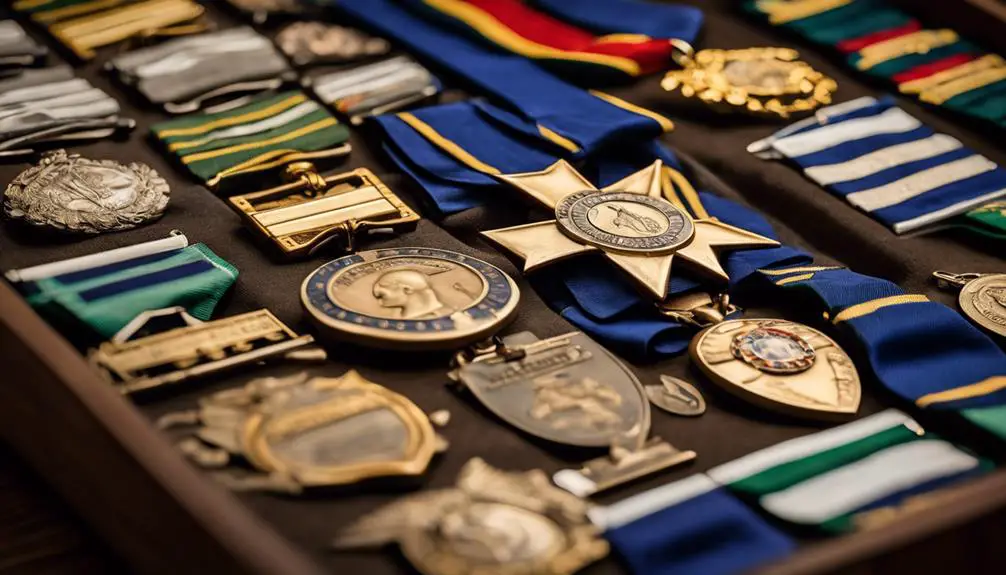You're likely familiar with military medals, but did you know that many have secret nicknames only insiders know, like the Navy Cross being referred to as the 'Cross of Valor' or the Purple Heart simply as the 'Heart' or 'PH'? These medal nicknames originate from sources like medal design, purpose, or rarity. You'll find that understanding military slang for medals is essential for grasping military culture. From the Army's 'MoH' for Medal of Honor to the Navy's 'fruit salad' for ribbons and medals, each branch has its own unique lingo. Dive deeper into the world of military medals and discover the stories behind these secret meanings.
Medal Nicknames 101
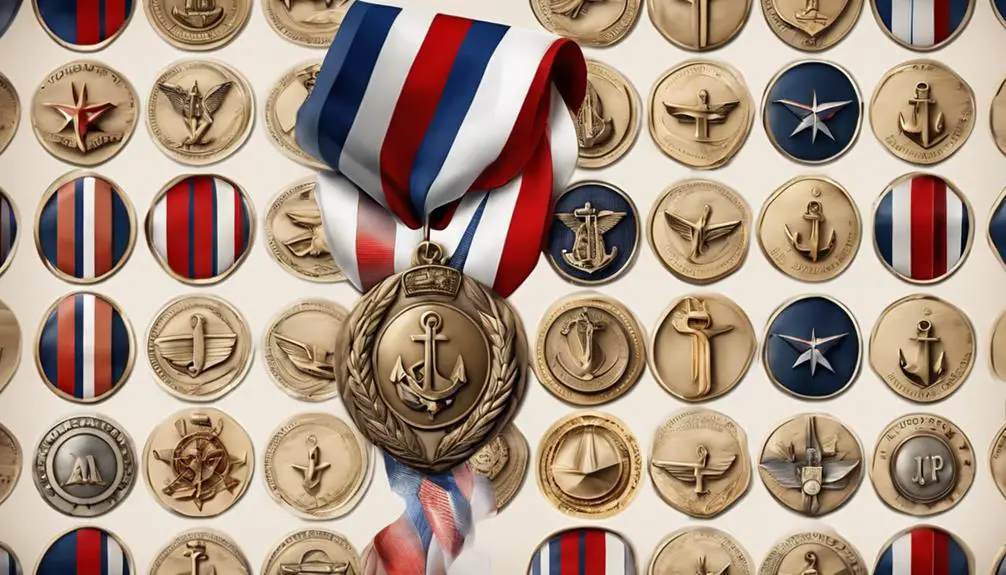
You'll frequently come across military slang for medals, which can be perplexing if you're not familiar with the lingo, so it's vital to learn the common medal nicknames used by veterans and active-duty personnel. Medal mythology suggests that these nicknames originated from various sources, including the medal's design, its purpose, or even its rarity. For instance, the Navy Cross is often referred to as the 'Cross of Valor' due to its prestigious nature and the valorous actions it recognizes. Similarly, the Purple Heart is nicknamed the 'Heart' or 'PH' because of its distinctive heart-shaped design. Understanding these slang origins is essential to grasping the nuances of military culture. By familiarizing yourself with these medal nicknames, you'll better comprehend the language and camaraderie shared among military personnel. This knowledge will also help you appreciate the significance of each medal and the sacrifices made by those who've earned them.
Army Slang for Valor Awards
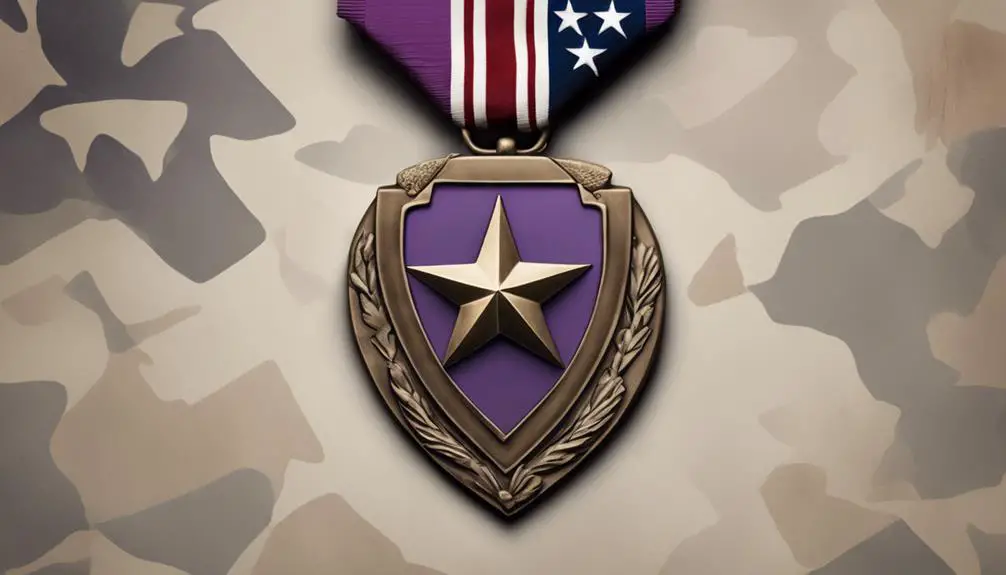
In the Army, valor awards have their own distinct slang, with the Medal of Honor often referred to as the 'MoH' or simply 'The Medal.' You'll also hear the Distinguished Service Cross, the nation's second-highest award for valor, referred to as the 'DSC.' The Silver Star, awarded for gallantry in action, is often called the 'SS.' These heroic honors are earned in combat, and those who receive them are respected and admired by their peers.
Combat badges, such as the Combat Infantry Badge (CIB) and the Combat Action Badge (CAB), also have their own slang. The CIB, awarded to infantrymen who engage in combat, is often called the 'CIB Badge.' The CAB, awarded to soldiers who engage in combat, is simply referred to as the 'CAB.' These combat badges are worn with pride, symbolizing a soldier's bravery and sacrifice in combat. By using these slang terms, soldiers can quickly identify fellow warriors and show respect for their service.
Navy and Marine Corps Lingo
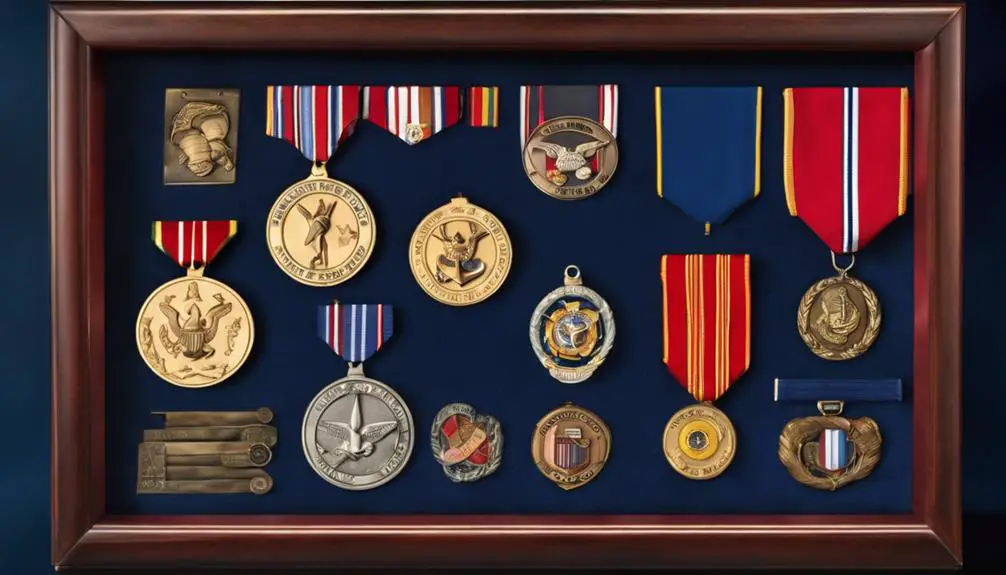
Sailors and Marines have their own distinct lingo for medals and badges, reflecting their unique culture and traditions. You'll often hear them use phrases like 'fruit salad' to describe the colorful array of ribbons and medals on a sailor's chest. This lingo has its roots in Fleet slang origins, which date back to the early days of naval warfare. For instance, a sailor's 'rack' refers to the display of medals and badges on their uniform, showcasing their accomplishments and pride.
As you explore further into Navy and Marine Corps culture, you'll discover Sailor's pride phrases like 'Esprit de Corps' (spirit of the corps), emphasizing the camaraderie and unity among sailors. You might also hear 'Fair winds and following seas,' a common farewell phrase wishing colleagues good luck and smooth sailing. These idioms not only add flavor to naval traditions but also underscore the strong bonds within the Navy and Marine Corps communities. By embracing this lingo, you'll better understand the nuances of naval culture and the pride that comes with serving in the Navy or Marine Corps.
Air Force and Coast Guard Jargon
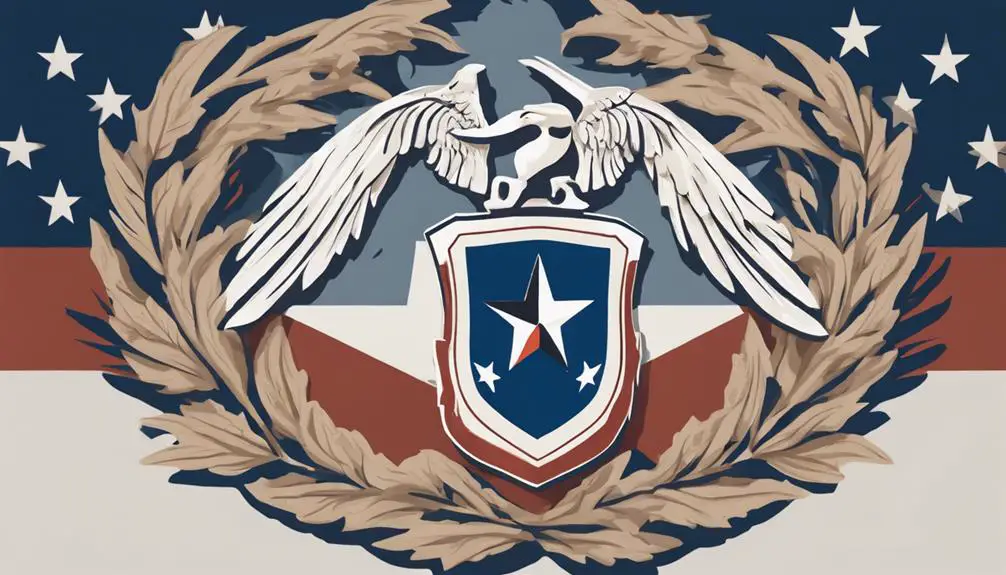
As you explore the world of Air Force and Coast Guard jargon, take note of the distinct terminology that reflects their unique cultures and histories. You'll discover that flying terminology is an integral part of their language, with phrases like 'bogeys' for unknown aircraft, 'angels' for altitude in thousands of feet, and 'vectors' for navigational directions. These terms are woven into the fabric of their everyday communication, showcasing their expertise in aviation.
When it comes to Aviation Honors, you'll find that the Air Force and Coast Guard have their own set of medals and decorations that recognize exceptional bravery, skill, and service. The Air Force's prestigious awards include the Medal of Honor, the Air Force Cross, and the Distinguished Service Medal. Similarly, the Coast Guard's notable honors include the Coast Guard Medal, the Navy Cross, and the Distinguished Flying Cross. As you investigate further into their jargon, you'll uncover the rich history and heritage behind these honors, which are deeply rooted in the values and traditions of these esteemed branches.
Decorations With Secret Meanings
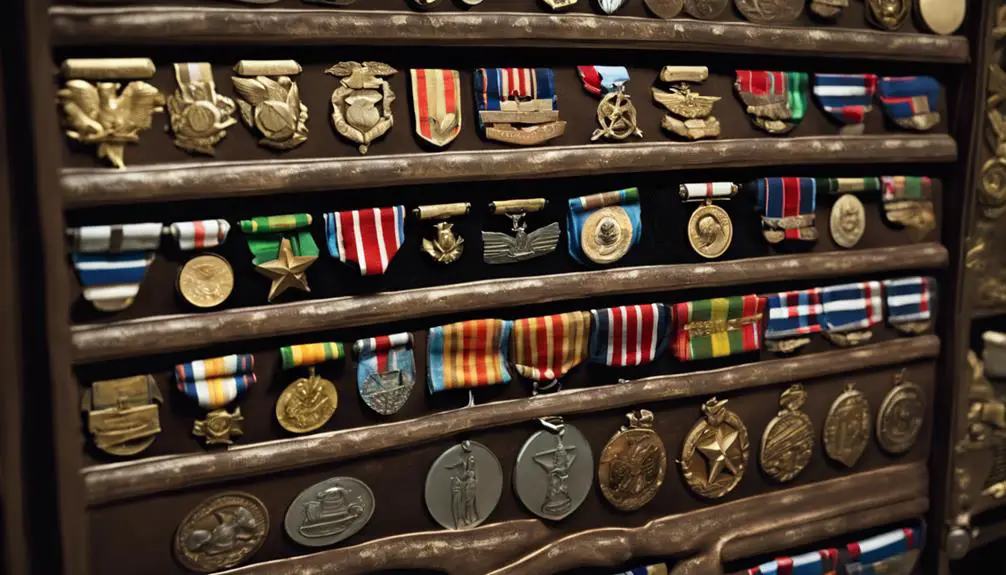
Many military decorations, such as the Purple Heart or the Bronze Star, have hidden meanings behind their designs, and you'll be surprised to discover the significance of these symbols. As you explore further, you'll uncover that these medals are more than just shiny trinkets; they're hidden honors that convey covert commendations. The Purple Heart, for instance, features a heart-shaped medal with a gold border, symbolizing the sacrifice and bravery of those wounded or killed in action. The Bronze Star, on the other hand, boasts a bronze star with a suspension ribbon, representing exceptional meritorious service.
As you examine these decorations, you'll realize that each element, from the colors to the shapes, holds a specific meaning. The colors, for example, often represent virtues like courage, loyalty, and sacrifice. The shapes, too, carry symbolic meanings, such as the star, which represents excellence and achievement. By understanding the hidden meanings behind these decorations, you'll gain a deeper appreciation for the sacrifices and achievements of those who've earned them.
Behind the Slang: Stories Uncovered
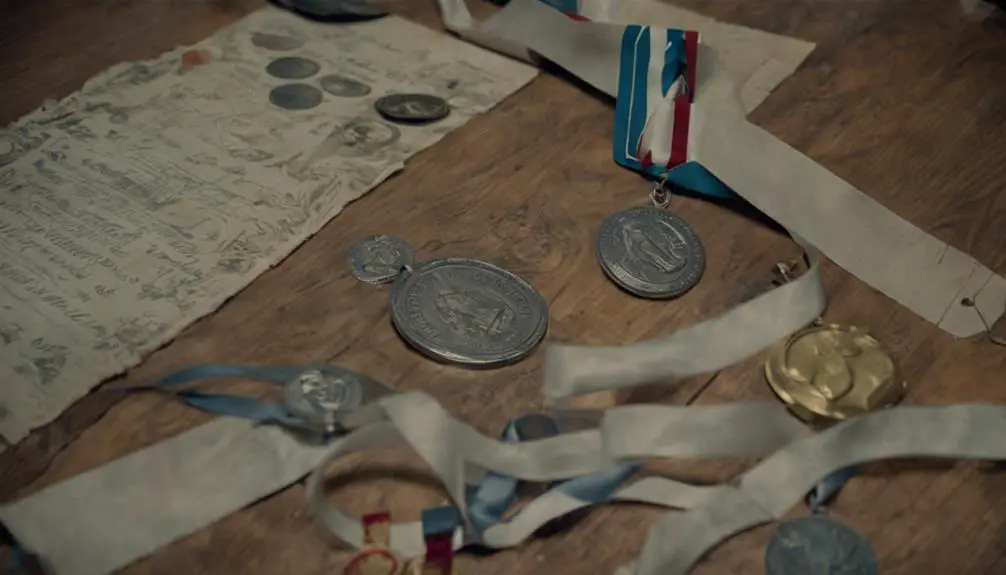
Beyond the formalized language of military medals lies a world of colloquialisms, where unofficial nicknames and slang reveal the human stories and experiences behind the decorations. As you investigate the world of military slang, you'll discover that each term has a unique origin and mythology surrounding it. You might find yourself wondering, what's behind the slang term 'CIB' for the Combat Infantryman Badge? Or, why is the Purple Heart nicknamed the 'Purple'?
Uncovering the slang origins and medal mythology reveals the personal anecdotes, historical events, and cultural influences that have shaped the language of military decorations. For instance, the term 'CIB' originated from the Army's need to recognize infantrymen who fought on the front lines, while the Purple Heart's nickname stems from its deep purple ribbon. By exploring these stories, you'll gain a deeper understanding of the people and events that have shaped the language of military medals. As you continue to investigate, you'll find that the slang and mythology surrounding military medals are evidence of the human experiences and sacrifices that have defined military history.
Frequently Asked Questions
What Is the Origin of Using Slang for Military Medals?
You're about to uncover the fascinating story of how military medals got their slang names. It's a tale that echoes the ancient Greeks' love for cryptic language, where Hermes' swift wings symbolized speed and stealth. Similarly, the medal lingo evolution began, with slang terminology history tracing back to World War I. You'll find that soldiers, seeking confidentiality and camaraderie, created coded language to describe their decorations, birthing a unique dialect that's been passed down through generations.
Are Medal Nicknames Officially Recognized by the Military?
You might assume that the military officially recognizes medal nicknames, but the truth is, there's no formal recognition in official documentation. While some medals have widely accepted nicknames, they aren't formally acknowledged in military protocol or regulations. This lack of official recognition doesn't mean the nicknames aren't widely used, but it highlights the distinction between informal traditions and formal recognition.
Can Civilians Use Military Slang for Medals?
When you use cultural symbols or language from a group you're not part of, it raises cultural appropriation concerns. This applies to military slang for medals, where using terms like 'fruit salad' or 'bling' without serving could be seen as disrespectful. As linguistic evolution impacts language, it's important to take into account the origins and context of these terms. If you're a civilian, using military slang for medals might be seen as insensitive or pretentious, so it's important to be mindful of your audience and the implications of your words.
Are All Military Medals Awarded With a Nickname?
You might be surprised to know that nearly 70% of military medals have nicknames. But, are all military medals awarded with a nickname? Not necessarily. Some medals, like the Purple Heart, are too revered to be given a colloquial moniker. Military Medal Monikers are often born from camaraderie and shared experiences. However, Medal Nickname Etiquette dictates that not all medals warrant a casual alias, especially those with solemn significance.
Are Medal Slang Terms Used Universally Across All Branches?
You might assume that medal slang terms are universally adopted across all branches, but that's not the case. In reality, branch specific preferences play a significant role in shaping medal lingo variations. While some terms may be widely recognized, others are unique to specific branches or even units. As you explore the world of military medals, you'll discover that terminology differences exist, reflecting the distinct cultures and traditions of each branch.

